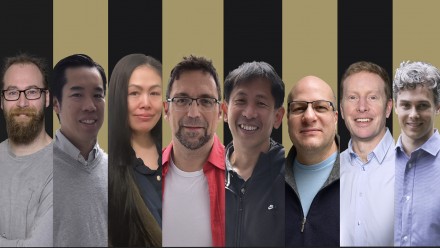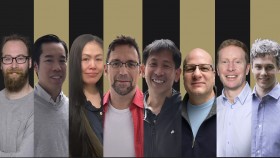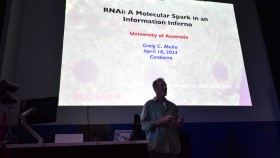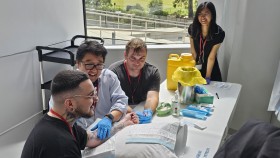Celebrating International Day of Women and Girls in Science
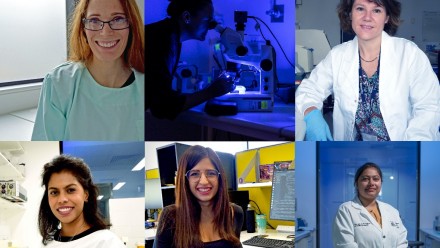 Dr Nathalie Dehorter (Phd ’10) is a group leader at JCSMR, studying the physiology of neurons during development and in disease.
Dr Nathalie Dehorter (Phd ’10) is a group leader at JCSMR, studying the physiology of neurons during development and in disease.
 Ms Sarika Abbott is the Laboratory Manager for the Eccles Institute of Neuroscience.
Ms Sarika Abbott is the Laboratory Manager for the Eccles Institute of Neuroscience.
 Ms Marina Reixachs is a postgraduate student in The Eyras Group, researching the biology of RNA and cancer using computational methods.
Ms Marina Reixachs is a postgraduate student in The Eyras Group, researching the biology of RNA and cancer using computational methods.
 Ms Naomi Mitchell is a Senior Research Assistant of the The Quinn Group and the Manager of the JCSMR Drosophila Facility.
Ms Naomi Mitchell is a Senior Research Assistant of the The Quinn Group and the Manager of the JCSMR Drosophila Facility.
 Ms Anukriti Mathur is a post-doctoral student in The Man Group, currently studying the tools used by food-borne bacteria to cause illness in humans.
Ms Anukriti Mathur is a post-doctoral student in The Man Group, currently studying the tools used by food-borne bacteria to cause illness in humans.
 Dr Tanya Soboleva (PhD ’02) is a group leader at JCSMR, researching fundamental science of epigenetic regulation of genes.
Dr Tanya Soboleva (PhD ’02) is a group leader at JCSMR, researching fundamental science of epigenetic regulation of genes.
 Dr Anjali Gowripalan (PhD ‘18) is an early career researcher studying viruses in the The Tscharke Group.
Dr Anjali Gowripalan (PhD ‘18) is an early career researcher studying viruses in the The Tscharke Group.

To celebrate International Day of Women and Girls in Science we are highlighting the different ways to be a scientist. Women are significantly more likely than men to perform experiments in laboratories worldwide, and their role in the production of scientific literature is vast.
Researchers at the John Curtin School of Medical Research share their experiences of science and why they love being part of the research community.
Dr Nathalie Dehorter (Phd ’10) is a group leader at JCSMR, studying the physiology of neurons during development and in diseases such as schizophrenia or Parkinson’s.
“I love the thrill of new discoveries while solving global challenges. My favourite technique in the laboratory is a patch-clamp, because it helps me see neurons in action.”
Ms Marina Reixachs is a postgraduate student in The Eyras Group, researching the biology of RNA and cancer using computational methods.
“I am a computational biologist, which is a bit different of what people imagine of a scientist - far from lab coats, pipettes and assay tubes. I work just with a computer, analysing the information that is stored in our genomes. It is fascinating the number of things one can answer with just a computer, the appropriate data and some chunks of code.
I would say that the best part of being a scientist is feeling that what matters is the journey itself, even more than the destination. You keep learning and growing all the way, when things go well but also when they don’t. At least, this is how I see it.”
Ms Naomi Mitchell is a Senior Research Assistant of the The Quinn Group and the Manager of the JCSMR Drosophila Facility.
“I am a senior research officer in the cancer models group at JCSMR. I love my little fruit flies for exploring how brain cancer occurs, with the ultimate goal of developing new treatments.
The best part of being a scientist is that I’m doing something new all the time and making new discoveries, it is really exciting and fun.”
Ms Anukriti Mathur is a post-doctoral student in The Man Group, currently studying the tools used by food-borne bacteria to cause illness in humans.
“I love working in science because the process of unravelling a previously unknown scientific fact using logic and reasoning is like an adrenaline rush to me. In addition, scientific research provides me with a unique power to make a difference in the lives of people. Lastly, the world of science is fun because you get to collaborate with fantastic minds from around the world to exchange knowledge and in turn make new friends.
My eyes love to look down under the microscope to visualise the battleground between microbes and immune cells. It is fascinating to observe a small bacteria swimming towards an immune cell to attack. Microscopy technique such as the electron microscopy helped me to work out the mechanism of action of host immunity against the bacteria of interest.”
Dr Tanya Soboleva (PhD ’02) is a group leader at JCSMR, researching fundamental science of epigenetic regulation of genes.
“The thing that I love about science is the freedom of exploration. Every new question you ask, every new answer you get, brings about ten more questions that are even more interesting and exciting than the original. You never know where the project is going to take you and what is awaiting you around the corner.
My favourite piece of equipment is a sedimentation chamber, used to separate different types of cells. I study spermatogenesis [the process of sperm creation] so we use the chamber to separate sub-populations of maturing sperm. It is the most unassuming homemade piece of equipment! But it is capable of doing the most amazing things. Some of the most important discoveries in my field were made because of this technique. I learnt this method and had the chamber made during a 3-month sabbatical in France several years ago.”
Dr Anjali Gowripalan (PhD ‘18) is an early career researcher studying viruses in the The Tscharke Group.
“One of the best parts about being a scientist is convincing people to see something they might be familiar with in a completely new light.
In my line of work, viruses are typically associated with negative ideas of sickness and fear. But we often forget about the good viruses. Take vaccinia virus - this virus formed the basis for the smallpox vaccine and led to the first eradication of a human disease in history. I like that my research may be contributing to improving the reputation of these little lifesavers.”
Ms Sarika Abbott is the Laboratory Manager for the Eccles Institute of Neuroscience.
“I have always been interested in Science! In Science, the process of learning never stops; there is logic and reason, and most importantly research makes a difference. I am a laboratory manager and what I love the most about this role is that I get to support researchers with their research and watch them succeed.”







